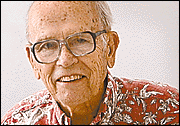Advertisement - Click to support our sponsors.


Hawaii’s World
THE state Legislature, which opens its 2000 session tomorrow, has 25 senators and 51 representatives, all elected from single-member districts. Multi-member districts
The late Gov. John A. Burns felt single-member districts represent democracy at its best -- grass-roots government. All of his successors think it is a terrible system. I think so, too.
Before and even immediately after statehood we had districts elect as many as six members. In the 1980 voting we still had House districts with two and three members and Senate districts electing two at a time. For a time the Honolulu City Council treated Oahu as one big district, with all its members elected at large.
The single-member system gives maximum influence to lobbies, most notably government unions. They have member-voters who can bloc-vote for (or against) candidates with effectiveness, with turnout percentage well above average voter turnout. Their troops have proved stronger than the business money that dominated pre-1954.
OK, you say, isn't that the democratic way? But we used to consider multi-member districts democratic, too. They served the general interest better. They even produced (by my judgment, at least) more statesmen than today -- if you consider a statesman a person who can rise above narrow interest politics to take a broader view of the future interest of all citizens.
They are better insulated from the pressure of single-interest lobbies that might kill off one candidate in the district but have a harder time killing off a second or third.
Our government unions well know just every legislative member from every district. They probably have done favors for most of them, like helping with door-to-door literature distribution at election time. They create IOUs in this way and -- in most districts --can be a re-election threat to those who cross them.
Thus, I expect Governor Cayetano's proposed civil service and other government reforms to be pretty well limited to those acceptable to the government unions. This means: not much.
I hope he will try to reach the voting public over the heads of his foes and promise voter reminders in the September and November elections of which legislators supported him and which ones didn't. But I'm super-pessimistic about getting the government reform we need. Too many legislators still will march to the protectionist, management-stifling government union tune.
It's no help that the economy is taking an upturn. This will take some of the wind out of the governor's sails as he contends -- very correctly -- we need to be more efficient to compete globally. A reduced sense of emergency may smother his correct ideas and deprive us of their long-term benefits.
TOO many legislators and voters still think profit is a dirty word rather than the stimulus that has given America the world's strongest economy. We have a chance to change back to multi-member districts for the 2002 voting but I am pessimistic.
By May 1 next year, after the year 2000 census results are in, we must convene a reapportionment commission to allocate seats for the next decade. It could create some multi-member districts but would have to be prepared to justify them as not discriminatory.
A reason I fear it won't do this is that the year 2001 Legislature's leaders will designate eight of its nine members. The leaders probably will look for kindred spirits to support the status quo under which they were elected. Government unions will think that's great. The rest of us will be losers.
A.A. Smyser is the contributing editor
and former editor of the the Star-Bulletin
His column runs Tuesday and Thursday.